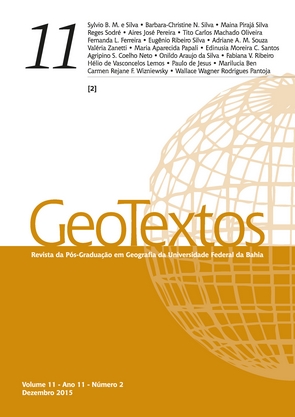(IN)FORMAL RURAL EDUCATION IN THE AGRO-INDUSTRIAL CAPITAL OF WESTERN PARANÁ
DOI:
https://doi.org/10.9771/1984-5537geo.v11i2.13442Keywords:
Education, Work, Precariousness, Agro-industryAbstract
This article is the result of studies on cooperative education in western Paraná provided by business cooperatives, where the objective is to understand the qualification/disqualification relationships present in (in)formal education in agribusiness focused on capital and consumption. In the dialectic relationship between the rural environment and agro-industry, field workers (called integrated/associated workers) are constantly being qualified/disqualified in order to serve the interests of the (re)production of capital imposed by the agro-industrial complex and to meet international market requirements. While workers are being qualified/disqualified, they experience contradictory and confrontational processes in the social relations of production. Thus, understanding how integrated/cooperative families and agro-industry workers are educated to serve the interests of western Paraná’s agro-industrial capital is the general objective of this study. The study area comprises western Paraná, which is characterized by a strong agro-industrial presence in addition to significant trade and service sectors (which are partially focused on serving agroindustry demands). The research covers the period 1960–2010, which was exemplified by profound changes in the rural environment resulting from productive restructuring between capital and labor.Downloads
Downloads
Published
How to Cite
Issue
Section
License
Autores que publicam nesta revista concordam com os seguintes termos:
Autores mantém os direitos autorais e concedem à revista o direito de primeira publicação, com o artigo simultaneamente licenciado sob a Licença Creative Commons Creative Commons CC BY que permite o compartilhamento do trabalho com reconhecimento da autoria e publicação inicial nesta revista. Esta licença permite que outros distribuam, remixem, adaptem e criem a partir do seu trabalho, mesmo para fins comerciais, desde que lhe atribuam o devido crédito pela criação original. É a licença mais flexível de todas as licenças disponíveis. É recomendada para maximizar a disseminação e uso dos materiais licenciados. Ver o resumo da licença em: https://creativecommons.org/licenses/by/4.0/ Ver o texto legal da licença em: https://creativecommons.org/licenses/by/4.0/ Consulte o site do Creative Commons: https://creativecommons.org/licenses/?lang=pt
Autores têm autorização para assumir contratos adicionais separadamente, para distribuição não-exclusiva da versão do trabalho publicada nesta revista (ex.: publicar em repositório institucional ou como capítulo de livro), com reconhecimento de autoria e publicação inicial nesta revista.
Autores têm permissão e são estimulados a publicar e distribuir seu trabalho online (ex.: em repositórios institucionais ou na sua página pessoal) a qualquer ponto antes ou durante o processo editorial, já que isso pode gerar alterações produtivas, bem como aumentar o impacto e a citação do trabalho publicado (Veja O Efeito do Acesso Livre).






